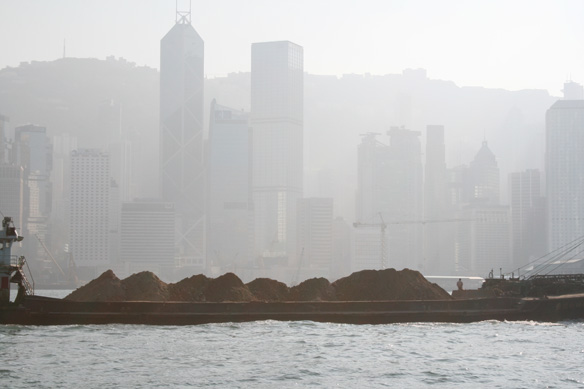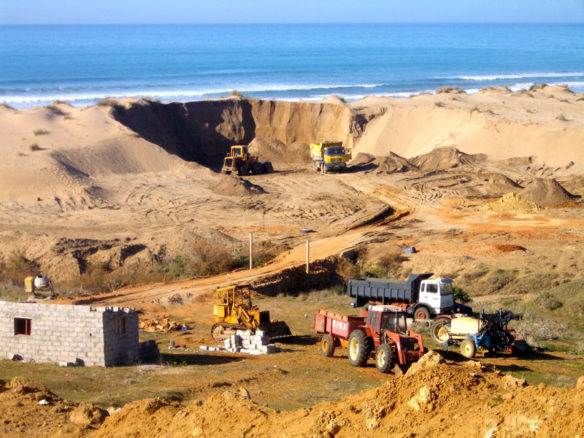
Sand barges, Hong Kong, South China Sea. Photograph: © SAF — Coastal Care
As of 2011-2012, when “Sand-Wars” filmmaker Denis Delestrac and team, were first collecting and unveiling unpublished sand mining datas and information from the professionals involved, the Sand business was estimated to be a $70 billion industry, worldwide…!
“Sand is the second most consumed natural resource, after water. The construction-building industry is by far the largest consumer of this finite resource. The traditional building of one average-sized house requires 200 tons of sand; a hospital requires 3,000 tons of sand; each kilometer of highway built requires 30,000 tons of sand… A nuclear plant, a staggering 12 million tons of sand…”—Denis Delestrac -(©-2013) “Sand Wars” Multi Award-Winning Filmmaker.
Excerpts;
Across Asia, rampant extraction of sand for construction is eroding coastlines and scouring waterways. t’s a global concern, but especially acute in Asia, where all trends show that urbanization and the region’s big construction boom are going to continue for many years.
Already, scientists have linked poorly regulated and often illegal sand removal to declines in seagrasses in Indonesia and in charismatic species such as the Ganges River dolphin and terrapins in India and Malaysia…
Read Full Article; Science (03-01-2018)
Such Quantities of Sand, The Economist (07-27-2015)
Asia’s mania for reclaiming land from the sea spawns mounting problems…
Demand for sand leads to global ecological crisis; MongaBay (02-08-2018)
Every day, miners remove 5,500 to 6,000 truckloads of sand (about 20 tons each) from the scenic beachfronts and 17 river basins of Tamil Nadu, India. Fueled by a real estate boom estimated to generate $180 billion annually by 2020, India is digging 500 million metric tons of sand every year, feeding an industry worth more than $50 billion. And India’s hunger is bound to increase…
The environmental loss of illegal sand mining in South Africa, ENCA (01-07-2016)
Research shows that KwaZulu-Natal and the Eastern Cape are home to more than 200 illegal sand mining operations. Umvoti River sand is as good as gold in the construction industry. Its stellar components have placed it among the best sand in South Africa for building purposes. But this comes at a great environmental loss…
A looming tragedy of the sand commons; Science (09-08-2017)
Because of the difficulty in regulating their consumption, common-pool resources are prone to tragedies of the commons as people may selfishly extract them without considering long-term consequences, eventually leading to overexploitation or degradation. Even when sand mining is regulated, it is often subject to rampant illegal extraction and trade…
Sand Mining: Growing Pains of Cross-Border Trade, Yale Global (08-29-2017)
Seabed mining could destroy ecosystems; Science Daily (01-22-2018)
Mining on the ocean floor could do irreversible damage to deep-sea ecosystems, says a new study of seabed mining proposals around the world. The deep sea (depths below 200m) covers about half of the Earth’s surface and is home to a vast range of species…
Sand Is in Such High Demand, People Are Stealing Tons of It, By Dave Roos; HowStuffWorks (03-06-2017)
As strange as it may sound, sand is one of the world’s hottest commodities. The global construction boom has created an insatiable appetite for sand, the chief ingredient for making concrete. The problem is that sand isn’t as abundant as it used to be. And when high demand and high value meets scarcity, you open the doors to smuggling…
The Conservation Crisis No One Is Talking About, By John R. Platt, TakePart (09-21-2016)
Beaches around the world are disappearing. No, the cause isn’t sea-level rise, at least not this time. It’s a little-known but enormous industry called sand mining, which every year sucks up billions of tons of sand from beaches, ocean floors, and rivers to make everything from concrete to microchips to toothpaste…
Tragedy of The Commons: Corrosive Growth of the Illegal Sand Mining Mafia; The Citizen (01-04-2016
Not many people may know that illegal sand mining is a nationwide phenomena in India, and with spurt in housing and infrastructure projects, the illegal sand mining is thriving beyond the ambit of formal economy and law and order. Sand is everywhere and so is the sand mafia…
Sand Thieves Are Eroding World’s Beaches For Castles Of Cash, by Martine Valo, Le Monde (09-2013)
The pillaging of sand is a growing practice in the world. This is because it represents 80% of the composition of concrete that it is the object of such greed…
The Economist explains: Why there is a shortage of sand; The Economist (04-24-2017)
It may be plentiful, but so is the demand for it…
Sand, Rarer Than One Thinks: A UNEP report (GEA-March 2014)
Despite the colossal quantities of sand and gravel being used, our increasing dependence on them and the significant impact that their extraction has on the environment, this issue has been mostly ignored by policy makers and remains largely unknown by the general public.
In March 2014 The United Nations released its first Report about sand mining. “Sand Wars” film documentary by Denis Delestrac – first broadcasted on the european Arte Channel, May 28th, 2013, where it became the highest rated documentary for 2013 – expressly inspired the United Nations Environment Programme (UNEP) to publish this 2014-Global Environmental Alert.
Sand Wars, An Investigation Documentary, By Multi Award-Winning Filmmaker Denis Delestrac (©-2013)
“The construction-building industry is by far the largest consumer of this finite resource. The traditional building of one average-sized house requires 200 tons of sand; a hospital requires 3,000 tons of sand; each kilometer of highway built requires 30,000 tons of sand… A nuclear plant, a staggering 12 million tons of sand…”
As of 2011-2012, when investigative filmmaker Denis Delestrac and team, were collecting and unveiling sand mining datas and information from the professionals involved, “…the sand business was estimated to be a $70 billion industry, worldwide…!”—Denis Delestrac (©-2013)
Global Sand Mining: Learn More, Coastal Care
BE THE CHANGE:
PETITION: Take Action To End Global Beach Sand Mining, Coastal Care

Illegal beach and dune sand mining operations, near Tangier, Morocco. Photograph: © SAF — Coastal Care








